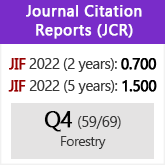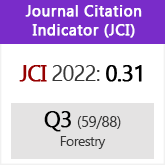Production of Sulfate Pulps from Cardoon (Cynara cardunculus L.). The effect of Chipping of Pulp Quality
Abstract
In the utilization of cardoon (Cynara cardunculus L.) to produce sulfate pulps the cooking conditions and the chip size are the factors that determine the final pulp quality. The aim of this work is to stablish the range of cooking variables that produce good delignified pulps and to study the effect of chip size on the pulp quality. The results have shown that cooking time not inferior than 90 min (30 up to 170° C plus 60 at 170° C) and 16 % active alkali) are neccesary to obtain good delignified pulps. Chipping into a small size (1.7 cm) greatly improves delignification with no negative effect on paper quality. Cardoon sulfate pulps refine easily and showed good mechanical properties, although they present drainage difficulties and an extremely low porosity. So, it is neccesary to go into a procedure to dephithing that avoid the problems caused by the high fines content.Downloads
© CSIC. Manuscripts published in both the printed and online versions of this Journal are the property of Consejo Superior de Investigaciones Científicas, and quoting this source is a requirement for any partial or full reproduction.
All contents of this electronic edition, except where otherwise noted, are distributed under a “Creative Commons Attribution 4.0 International” (CC BY 4.0) License. You may read here the basic information and the legal text of the license. The indication of the CC BY 4.0 License must be expressly stated in this way when necessary.
Self-archiving in repositories, personal webpages or similar, of any version other than the published by the Editor, is not allowed.















